Columbia County & Lake City Throw Utility Vetting Rules Out the Window To Bring a Water Bottling Plant to the Plum Creek - Weyerhaeuser Mega Site
Posted December 5, 2020 08:40 pm | (1 comment)
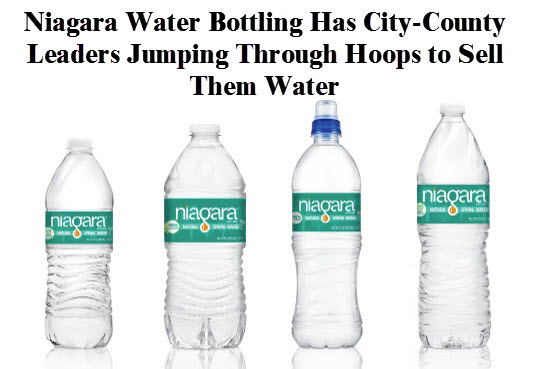
COLUMBIA COUNTY, FL – Columbia County has long been known for its quintessential backroom dealing. Lately, it has gone over the top with utility deals between the County and the City. Both Columbia County and Lake City are ignoring their written utility vetting policies.
Part I: Lake City Utilities, an interesting history
 For over seven decades, Lake City was the
utility provider for Lake City and the
contiguous areas of Columbia County close to
Lake City.
For over seven decades, Lake City was the
utility provider for Lake City and the
contiguous areas of Columbia County close to
Lake City.
![]()
![]() In 1971, the City was written up by the state
for discharging raw sewage into Alligator Lake.
In 1971, the City was written up by the state
for discharging raw sewage into Alligator Lake.
On October 17, 1972, Public Law 95-72, the Federal Waters Pollution Control Act (amendments), was passed by the United States Congress and vetoed by President Richard Nixon.
President Nixon's veto was overridden by the Senate the same day and became law the next day when the House overrode the veto.
The Act made federal money available for wastewater treatment upgrades.
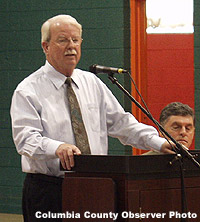
In 2010,
City Manager Wendell Johnson explained the City
Utility was humming along.
In 1973, Lake City was still discharging raw sewage into Alligator Lake.
The area's kids used to call it "Hamburger Lake," as that is what they thought the floating turds looked like.
In 1974, the City applied for federal aid.
To satisfy the grant's administrative requirements, public hearings were held in 1977, with the first one on August 10.
It was agreed that there would be a City-County Waste Water Board. That eventually fell apart, and the City took control of the City-County utility service.
In 1977, after years of preparation, the City was approved for a federal 201 grant to improve the St. Margret's Wastewater Treatment Plant (WWTP), the sewer plant for the City.
In 1984, the City was cited by the Florida Department of Environmental Protection (DEP) for its failure to get a permit for the WWTP (sewer) and continued pumping of raw sewage into Alligator Lake. The City was forced to sign a consent order with DEP to clean up its mess and straighten out its Act.
Consent orders became nothing new for Lake City.
In 1992, the Suwannee River Water Management District issued Lake City a 5-year water use permit (pumping water out of the ground) for 2.5 million gallons per day (gpd).
In 1997, recognizing drinking water piping and other water supply issues, another study was done. The City authorized a conceptual plan, route alignment, and preliminary cost estimate for new water transmission mains in a new well field on the east side of Lake City Airport. This plan looked forward to 2060.
In 1998, the City was issued another water use permit, this time for 2.828 mil gpd.
This new well field became the Price Creek well field, where the City gets just about all of its drinking water today.
On June 9, 2003, LC Water Superintendent Steve Roberts applied for a modification of the City water use permit, requesting 5.26 mgd, incorporating the new proposed usage of the new Price Creek well field.
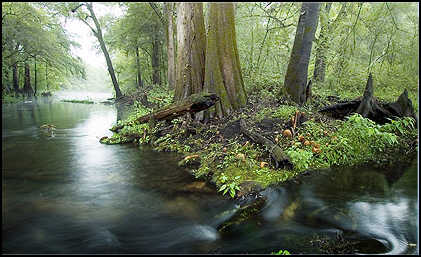
The Suwannee River Water Management District is
a steward of the environment. Photo: SRWMD
On December 11, 2003, the Water Management District approved a water use permit for 5.78 mgd.
For a little while, things were looking good for Lake City. It looked like it was going to build nine new wells. The Water Management District permit instructed that the City "must obtain legal control of all or a portion of the new well field property prior to construction of the nine proposed wells."
On December 7, 2010, the Water Management District received a request to modify the City water use permit, reducing it to five mil gpd.
The Price Street Well Field was on-line.
With much of the City's water supply infrastructure aging, water was leaking out all over. This was not specific to Lake City. Across America, communities were suffering the pangs of aging infrastructure, which is underground: "out of sight, out of mind."
The December 2010 application was for five mil gpd, with a maximum daily withdrawal of 16.4088 mil gpd. The City claimed the Price Creek Water Plant was serving 29,500 people, residential and commercial, with 8,366 connections. The request was denied and modified on April 12, 2011.
Among other things, the 2011 modified permit required Lake City to "implement measures to reduce the unaccounted for water loss to a level of 10% or less."
The Water Management District knocked down the previous 5.78 mil gpd to 4.1906 mil gpd, which is where it is today.
Permit Narrative: Lake City and the SRWMD
According to the application, the City "does not anticipate any expansion project to its system. All expansion will be a result of requests."
The application also mentions reclaimed water. "City of Lake City hopes
to expand reclaimed water to include residential irrigation."
The City's reclaimed water project has been a bust, something the Water Management District is not happy about.
The application also includes a "Demonstration of Need." The Water Management Staff reviewed and projected Lake City's "Average Daily Use."
2011 3.7674 mgd (million gallons day)
2016 3.8912 mgd
2021 4.0155 mgd
2024 4.1906 mgd
For the past few months, the City and the County have been crying the blues. Neither side of the street could come up with a cogent explanation, or admit to one, for the 4.1906 mgd usage. Each side had someone to blame.
The fact is the Water Management District permitted the City for its 2024 projected use, and nobody caught it.
When City Manager Joe Helfenberger came on board over two years ago, a utility study should have been done or begun. City Manager Helfenberger made a good start by hiring an assistant city manager who demonstrated a background and track record in water and wastewater utilities and government planning. Then, he wouldn't let him do his job and humiliated him. The assistant city manager resigned.
Supplying Untreated Water to Plum Creek
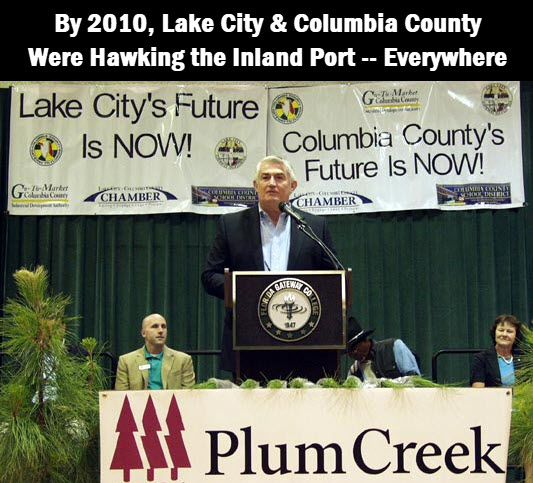
Ten years later, and still no utility plan | Observer photo
The Plum Creek – Weyerhaeuser industrial park on the east side of Lake City has been in the works since 2006. As reported earlier, Plum Creek – Weyerhaeuser doesn't want to spend its own money to develop the park.
![]() Recently, a water bottling plant has shown
interest in locating to the Plum Creek –
Weyerhaeuser property.
Recently, a water bottling plant has shown
interest in locating to the Plum Creek –
Weyerhaeuser property.
It needs lots of water. The City and County are calling it untreated industrial water.
The City and the County have been meeting behind closed doors for some time to come up with a plan to provide water to an unnamed bottler.
With much internal opposition, Lake City wants to beg off providing this water. It has come up with a scheme with the County to have the County provide the water by getting a permit, sinking wells, and then going into the utility business.
A secret and unapproved agreement between the City and the County has the County selling back its water well(s) and infrastructure to the City. City ordinance requires this deal to be vetted by the City Utility Committee.
The County's utility track record is abysmal. In Ellisville, it bought a junkyard package plant in a good ole' boy deal and spent untold amounts, keeping it in operation before having the state give it money for a new one. Columbia County loves free money.
For years, it was costing the County taxpayers $300,000 a year to subsidize the Ellisville utilities and thousands and thousands to keep its junkyard package (sewer) plant operating.
The County didn't tell the state that it had a real wastewater treatment plant designed for Ellisville, had most of the financing in place, put it out to bid, and didn't intended to build it. In some parts of the civilized world, that is against the law. In Columbia County, it's business as usual.
City and County Utility Vetting Rules Are In Black and White
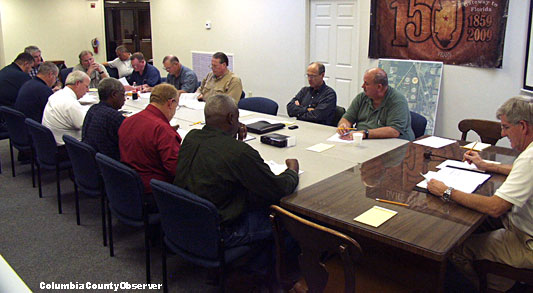
The City Utility Committee in 2009 before it was
disemboweled. It hasn't met in years.
By ordinance, Lake City has established a Utility Committee. This committee is charged with vetting everything that has to do with the City's Utilities, water and wastewater.
The language of the ordinance is clear and unambiguous. The Utility Committee is required to: "Study, investigate, develop, assist, advise and recommend to the city council any and all matters pertaining to the city utility systems."
The ordinance leaves nothing to chance, as it continues with the function of the Committee: [To] recommend from time to time to the city council action on establishing new kinds of utility services, preserving and expanding existing utility services, on the financial needs of the utility systems, on making any changes in the utility rates and charges and on making any changes in service which may be beneficial to the public."
The City Manager recently took it upon himself to call for a Citywide Utility Master Plan and other things.
The City Utility Committee is also charged with the master plan process.
The ordinance could not be more precise: "Initiate and review utility master planning efforts in the areas of water, sewer, natural gas, and stormwater projects. Review and recommend approval of projects and requests for extension of water, sewer, and gas lines for new development. Provide recommendations regarding major annual maintenance programs, i.e., lift station rehabilitation, leak detection programs, water tank refurbishment, systems enhancements, pilot programs to explore new or innovative operational techniques, utility standards, outside engineering proposals involving engineering services for water, sewer, gas and drainage projects."
The ordinance sums it up: "... the city council shall take no action with respect to making major improvements to the existing utility systems, extending and providing new developments and subdivisions with utility services ... without first receiving from the utility committee its recommendations relating to such changes."
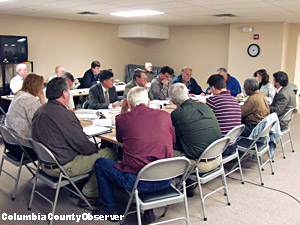
In 2009, the County had its own Utility
Committee. It didn't make a difference. When the
Committee didn't want to do what the insiders
wanted, the County did what it always did,
whatever it wanted.
In December 2010, Columbia County established the by-laws for the Columbia County Advisory Utility Board. The functions and duties of the County Utility Board were a mirror image of the City Utility Committee.
The number one job of the County Utility Committee is to "study, investigate, develop, assist, advise and recommend to the County Commission any and all matters pertaining to the County Utility Systems."
Interim County Manager David Kraus modified the City Utility Ordinance and turned it into the by-laws for the County Utility Committee.
Columbia County is rushing to get into the utility business. If it follows its own rules, it can't. At least, not yet.
Part III: The Water Bottler - Niagara
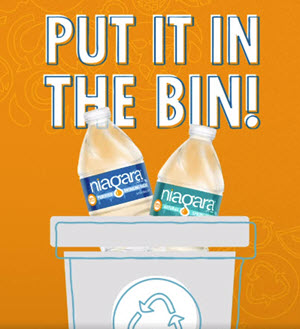
Niagara's Facebook page promotes recycling and
the responsible use of recyclable plastic. The
Columbia County 5, like dinosaurs, don't believe
in recycling.
![]() On November 19, 2020, City Manager Joe
Helfenberger, Interim County Manager David
Kraus, Lake City's new Assistant City Manager
Dan Sweat, and County Economic Development
Director Glen Hunter met after the evening's
County 5 meeting for a powwow.
On November 19, 2020, City Manager Joe
Helfenberger, Interim County Manager David
Kraus, Lake City's new Assistant City Manager
Dan Sweat, and County Economic Development
Director Glen Hunter met after the evening's
County 5 meeting for a powwow.
The next day four documents were produced, a pro forma letter to Mr. John Krug, the site developer and economic development manager for Niagara Bottling, and three memorandums of understanding between the City and the County agreeing to various measures to provide water and wastewater resources to the Weyerhaeuser Plum Creek Industrial mega-site.
One of the memorandums had the County agreeing to fix Lake City's water lines running to the site if it sprung a leak.
While all of this information needed to be vetted through the respective municipal and County utility committees and the County Economic Development Advisory Board, none of it was.
This is called checks and balances.
Many elected leaders and others are against water bottling and the plastic waste it produces.
Niagara claims to be responsible. However, it was impossible to connect to the company headquarters in California or find a working Niagara Bottling phone number in Florida.
Epilogue
The rules are in place to effectively vet companies that want to come to Columbia County.
The level of insider good ole' boy activity inside Lake City and Columbia County does not benefit the companies that want to locate here or the citizens.
Once again, Columbia County is living up to its reputation.
The legend continues.
